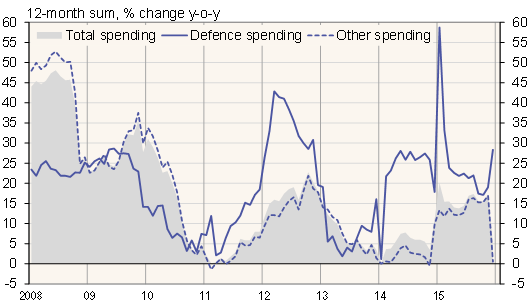BOFIT Weekly Review 4/2016
Russian federal budget revenues declined last year, while defence spending soared
In nominal ruble terms, federal budget revenues last year contracted 6 %. In real terms (i.e. taking inflation into consideration), they were down about one fifth. Revenues from taxes on oil & gas (i.e. production taxes and export duties) going entirely to the federal budget fell by one fifth even in nominal rubles. The finance ministry’s forecast from last spring was slightly exceeded, mainly because more oil than expected was exported. Other budget revenues increased 10 % (again, more than forecast) as value-added tax revenues, the budget’s single largest revenue item, increased and revenues from federal property, assets and services were up by one half.
Federal budget expenditures rose 5 % in nominal terms and contracted substantially in real terms. Expenditures slightly exceeded the original spending estimate, even if that plan was cut last spring. After increasing at an average rate of 18 % a year during 2007−2014, defence spending increased 28 % last year. Defence spending as a share of GDP increased a percentage point to 4.3 %. The last time this share was so large was in 1994. The Stockholm International Peace Research Institute (SIPRI) estimates that the defence share of GDP already reached 4.5 % in 2014. In contrast, non-defence expenditures last year rose just 0.5 %. The budget deficit was 1.9 % of GDP with interest payments on debt excluded. With the interest payments included, the deficit was 2.6 % of GDP, which was still much less than had been expected in last spring’s finance ministry estimate.
Federal budget expenditure growth in rubles, %

Source: Ministry of Finance.